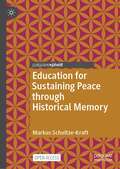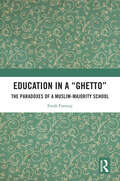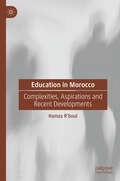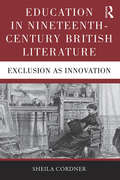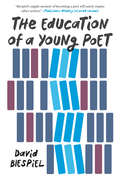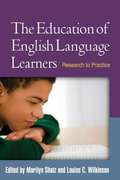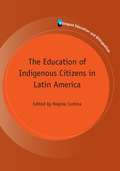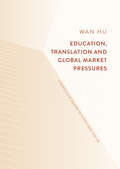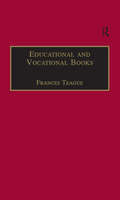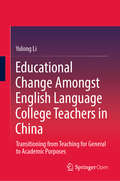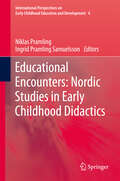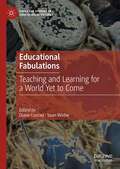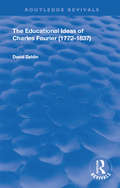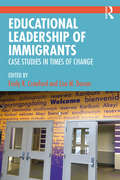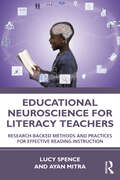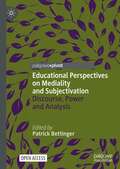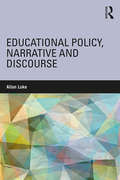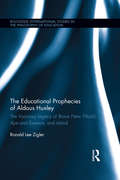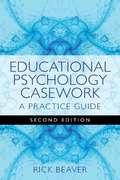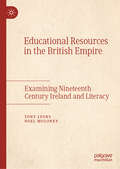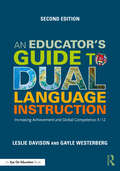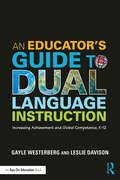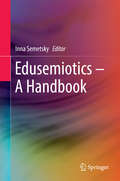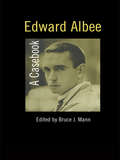- Table View
- List View
Education for Sustaining Peace through Historical Memory (Memory Politics and Transitional Justice)
by Markus Schultze-KraftInformed by the author’s long-standing work on violent conflict, peace and education in countries of the Global South, particularly Colombia, this open access book presents a comprehensive narrative about the relationship between peace education, historical memory and the sustaining peace agenda, advocating for the adoption of a new perspective on education for sustaining peace through historical memory. Education on and for peace in countries wrestling with, or emerging from, protracted violent conflict is up against major challenges, and both conventional and critical approaches to peace education are limited to address these. Incorporating a focus on historical memory, without losing sight of its own pitfalls, into peace education can support learners and teachers to come to grips with achieving positive, peace-sustaining change at both the micro (individual) and macro (social and institutional) levels, and to develop concepts and practices of effective and legitimate alternatives to violence and war. Conceived in these terms, historical memory-oriented peace education also stands to enhance the work-in-progress that is the UN-led sustaining peace agenda, including its Sustainable Development Goals.
Education in a 'Ghetto': The Paradoxes of a Muslim-Majority School
by Farah FarooqiThis book explores the structures of power and politics within a government-aided school situated in a Muslim-majority area in Delhi, India. It provides a look into how teachers, administrators and students in low-income and disadvantaged communities navigate limited opportunities and resources. The book discusses the socio-economic and cultural background of students, institutional rituals and practices and the impact of power relations on the students. It critiques the power and privilege of those in positions of authority in the school and showcases how bureaucratic systems in state run schools often do not consider the circumstances and interests of students and often hinder their growth. This book will be of interest to students of education, sociology, development studies, political science and social work. It will also be useful to educationalists, sociologists, political scientists, NGOs and those interested in the interface of state, society and education.
Education in Morocco: Complexities, Aspirations and Recent Developments
by Hamza R'boulThis book provides a comprehensive overview of historical and postmodern developments in the Moroccan education system, in order to construct a deeper understanding of its structural, linguistic and epistemic complexities. The chapters provide readers with a nuanced grasp of education and its intersections with wider geopolitical, sociopolitical and sociocultural conditions in Morocco as a postcolonial Southern country which is actively seeking to consolidate its position internationally. Covering education from primary school to university, the book features critical reflections on topics such as language-in-education, policy and planning, the politics of education, globalization and nationalist rhetoric. The book is an important reference for anyone interested in understanding the complexities of the education system in Morocco, and more specifically students and scholars who are interested in the sociology of education as well as education and language policy and planning.
Education in Nineteenth-Century British Literature: Exclusion as Innovation
by Sheila CordnerSheila Cordner traces a tradition of literary resistance to dominant pedagogies in nineteenth-century Britain, recovering an overlooked chapter in the history of thought about education. This book considers an influential group of writers - all excluded from Oxford and Cambridge because of their class or gender - who argue extensively for the value of learning outside of schools altogether. From just beyond the walls of elite universities, Jane Austen, Elizabeth Barrett Browning, Thomas Hardy, and George Gissing used their position as outsiders as well as their intimate knowledge of British universities through brothers, fathers, and friends, to satirize rote learning in schools for the working classes as well as the education offered by elite colleges. Cordner analyzes how predominant educational rhetoric, intended to celebrate England's progress while simultaneously controlling the spread of knowledge to the masses, gets recast not only by the four primary authors in this book but also by insiders of universities, who fault schools for their emphasis on memorization. Drawing upon working-men's club reports, student guides, educational pamphlets, and materials from the National Home Reading Union, as well as recent work on nineteenth-century theories of reading, Cordner unveils a broader cultural movement that embraced the freedom of learning on one's own.
The Education of a Young Poet
by David Biespiel"Biespiel’s supple memoir of becoming a poet will surely inspire other writers to embrace the bodily character of writing and feel the power and, sometimes, the emptiness of the act of writing poetry." —Publishers Weekly (starred review)The Education of a Young Poet is David Biespiel’s moving account of his awakening to writing and the language that can shape a life. Exploring the original source of his creative impulse—a great–grandfather who traveled alone from Ukraine to America in 1910, eventually settling as a rag peddler in the tiny town of Elma, Iowa—through the generations that followed, Biespiel tracks his childhood in Texas and his university days in the northeast, led along by the ""pattern and random bursts that make up a life."His book offers an intimate recollection of how one person forges a life as a writer during extraordinary times. From the Jewish quarter of Houston in the 1970s to bohemian Boston in the 1980s, from Russia’s Pale of Settlement to a farming village in Vermont, Biespiel remains alert to the magic of possibilities—ancestral journeys, hash parties, political rallies, family connections, uncertain loves, the thrill of sex, and lasting friendships. Woven throughout are reflections on the writer’s craft coupled with a classic coming–of–age tale that does for Boston in the 1980s what Hemingway’s A Moveable Feast did for Paris in the 1920s and Broyard’s Kafka Was the Rage did for Greenwich Village in the 1950s.Restless with curiosity and enthusiasm, The Education of a Young Poet is a singular and universal bildungsroman that movingly demonstrates, "in telling the story of one’s coming into consciousness, all languages are more or less the same."
Education of English Language Learners
by Louise Wilkinson Marilyn ShatzThis comprehensive volume describes evidence-based strategies for supporting English language learners (ELLs) by promoting meaningful communication and language use across the curriculum. Leading experts explain how and why learning is different for ELLs and pinpoint specific best practices for the classroom, illustrated with vivid examples. Particular attention is given to ways in which learning English is intertwined with learning the student's home language. The book addresses both assessment and instruction for typically developing ELLs and those with language disabilities and disorders. It demonstrates how educators and speech language professionals can draw on students' linguistic, cognitive, sociocultural, and family resources to help close the achievement gap.
The Education of Indigenous Citizens in Latin America
by Regina CortinaThis groundbreaking volume describes unprecedented changes in education across Latin America, resulting from the endorsement of Indigenous peoples' rights through the development of intercultural bilingual education. The chapters evaluate the ways in which cultural and language differences are being used to create national policies that affirm the presence of Indigenous peoples and their cultures within Mexico, Ecuador, Peru, Bolivia and Guatemala. Describing the collaboration between grassroots movements and transnational networks, the authors analyze how social change is taking place at the local and regional levels, and they present case studies that illuminate the expansion of intercultural bilingual education. This book is both a call to action for researchers, teachers, policy-makers and Indigenous leaders, and a primer for practitioners seeking to provide better learning opportunities for a diverse student body.
Education, Translation and Global Market Pressures: Curriculum Design In China And The Uk
by Wan HuThis book investigates the market-driven transformation of the higher education sector and the response given by the translation programmes in the UK and China, two vastly different social and economic contexts. It provides an in-depth look at six selected case studies, critically analysing how social, economic, and political factors have affect curriculum designs in different translation programmes. This innovative volume contributes to the development of knowledge in an important area of translation studies and opens a new way for providing both cross-national and cross-disciplinary perspectives in analysing the curricula of translation programmes.
Educational and Vocational Books: Printed Writings 1641–1700: Series II, Part One, Volume 5 (The Early Modern Englishwoman: A Facsimile Library of Essential Works & Printed Writings, 1641-1700: Series II, Part One #Vol. 8)
by Frances TeagueFrom the beginning of the seventeenth century, English society started to become preoccupied with education and how people acquired it. It is all the more surprising, then, that there should be relatively few early modern texts by Englishwomen devoted to the question of how one should learn. The four texts printed here are principally concerned with language and arithemetic. One of the reasons for the paucity of such writings is that many commentators viewed women's ability to write as a threat to social stability. The education of women was at best ad hoc. A few attended dame schools, and the wealthy could afford private tutors. Among her own family and friends, however, the individual learned girl was often celebrated, and instances of formal praise act as forewords to some of the texts printed in this volume.
Educational Change Amongst English Language College Teachers in China: Transitioning from Teaching for General to Academic Purposes (Springerbriefs In Education Ser.)
by Yulong LiThis open access book provides anthropological insights into the arduous yet rewarding journeys involved in selected TESOL teachers’ pedagogical transition to teaching English for Academic Purposes (EAP) at universities in Shanghai, the largest metropolitan area in China. Applying a unique combination of ethnography and phenomenology, the book offers innovative new perspectives on teacher education research. Drawing on the latest language education theory, it outlines a practitioner-friendly approach to EAP literacy. Teacher readers will especially benefit from the case studies presented here, which provide role models for teacher change in educational reform, as well as advice on their academic careers. In addition to addressing a timely and important research gap on EAP teachers in non-Western countries, the book is the ideal choice for readers interested in an update on English education in China.
Educational Encounters: Nordic Studies in Early Childhood Didactics
by Ingrid Pramling Samuelsson Niklas PramlingQualitative analyses of young children's learning in natural settings are rare, so this new book will make educators sit up and pay attention. It lays out a Nordic, or continental European teaching and learning paradigm whose didactic framework is distinct from the Anglo-American system. This analysis, which features contributions and case studies from researchers in a range of subjects, is built on principles such as the learner's perspective, establishing sufficient intersubjectivity, 'pointing out', and informing experience linguistically. After clarifying some historical background, the book discusses the contemporary emphasis in early childhood education on pedagogy/learning. What should 'didactics' mean in educating young children? The book examines the opportunities for learning that teachers provide for children in early childhood education, as well as how children respond to these opportunities. It presents empirical studies from a variety of naturalistic settings, including mathematics, making visual art, ecology, music, dance, literacy and story-telling, as well as learning about gender, morality and democracy. The authors seek to answer key questions about the processes involved in both teaching and learning. What challenges do teachers face as they try to expand children's knowledge in various fields of learning? How do they respond to these challenges, and what can we learn about children's corresponding uptake? What now requires further research? One key distinction in researching children's learning is between studies that look at 'process' and those that analyze 'product'. In the tradition of Piaget, Vygotsky and Werner, as well as Mercer and Valsiner's more recent work, this book advocates the importance and relative rareness of the former type of study.
Educational Fabulations: Teaching and Learning for a World Yet to Come (Palgrave Studies in Educational Futures)
by Diane Conrad Sean WiebeThis highly original collection presents speculative fiction as fiction-based research to re-imagine education in the future. Given the particular convergence of economic and governmental pressures in educational institutions today, schools represent imaginative sites especially well-suited to interrogation through an SF lens. The relevance for education of the exploration and interrogation of themes related to technology, human nature, and social organization is evident; yet the speculative fiction approach is unique in its harnessing of creative capacities to envision alternatives. The contributions in this collection are generated from educational experience and research, drawing on scholarship in curriculum studies and teacher education and on the authors' experiences and imaginations as teachers, teacher educators, educational scholars, and human beings.
The Educational Ideas of Charles Fourier: 1772-1837 (Routledge Revivals)
by David ZeldinOriginally published in 1969, this book aims to show that Charles Fourier has much to say that is of interest to modern edcationlists. Fourier hardly ever figures in histories of education because only recent developments in educational practice have shown his ideas to be of topical and practical importance to the schoolteacher and the planner of today. Fourier devised a system of education to suit a self-infulgent, democratic society, in which children's energies could be used in ways which were both socially useful and personally rewarding. He was a pioneer advocate of comprehensive education, so as to establish harmy between classes. He urged vocational training and guidance, so as to establish harmony between men and their work. He devised close links between education and industry, to bring pleasure into both school and work and to integrate the two. He was one of the first to plan social service to the community by children. This prophetic though eccentric writer, sometimes extravagant, often amusing, but always endearing, who has already exerted much influence on socialist theory, deserves to be better known by students of education.
Educational Leadership of Immigrants: Case Studies in Times of Change
by Emily R. Crawford Lisa M. DornerThis book prepares current and future educational leaders to adapt to the changing terrain of U.S. demographics, education, and immigration policy. Educational Leadership of Immigrants highlights the educational practices and discourses around immigration that intersect with policies and laws, in order to support K-12 students’ educational access and families’ participation in schooling. Drawing primarily on research from the fields of educational leadership and educational policy, this book employs a case study approach to address immigration in public schools and communities; school leaders’ responses to ethical dilemmas; the impact of immigration policy on undocumented students; and the varying cultural, sociopolitical, legal and economic contexts affecting students’ educational circumstances. Special features include: • case narratives drawn from real-life experiences to support the educational needs of immigrant students; • teaching activities and reflective discussion questions pertaining to each case study to crystallize leaders’ knowledge and facilitate their comfort levels in practice; • discussions of current challenges in education facing immigrant students, their families, educators, and school leaders, especially with changing immigration law.
Educational Neuroscience for Literacy Teachers: Research-backed Methods and Practices for Effective Reading Instruction
by Lucy Spence Ayan MitraBridging the world of reading instruction and applied cognitive neuroscience, this book presents research-backed reading instructional methods and explains how they can be understood through the lens of brain processes. Dispelling myths about neuroscience, Spence and Mitra explore how brain-based research informs literacy research in a way that is clear and accessible to pre-service teachers. Chapters address theories of reading, social-emotional learning, phonological processes, embodiment, multilingualism, reading comprehension, and more. Featuring examples of instruction and consistent "Did you know?" and "Food for thought" sections, readers will come away with a greater understanding of the reading brain and how neuroscience can facilitate effective instruction. Delving into the extent to which neuroscience can underpin reading research, this text is ideal for pre-service teachers, educators, and students in the fields of language arts and literacy, as well as cognitive neuroscience.
Educational Perspectives on Mediality and Subjectivation: Discourse, Power and Analysis (Palgrave Studies in Educational Media)
by Patrick BettingerThis open access book examines the complex relationship between education, media and power. Exploring the entanglement of education media and power structures, the contributions use various examples and case studies to demonstrate how subjectivation processes and digital structures interact with one another. The book asks which modes of subjectivation can be identified with current media cultures, how subjects deal with the challenges and potential of digitality, and how coping and empowerment strategies are developed. By addressing theoretical as well as empirical evidence, the chapters illuminate these connections and the subsequent significance for media education more widely.
Educational Policy, Narrative and Discourse
by Allan LukeThis collection of Allan Luke’s key writings on educational policy, curriculum, and school reform follows the development and use of critical discourse analyses to study educational policy and practice. Turning to a series of narrative analyses of the relationship between politics, culture, economics, and education, Luke‘s writings address the challenges of shifting from an academic and scientific critique of policy to ‘getting your hands dirty’ in the making of state educational policy. The volume includes international examples of policy formation for social justice and equity, and closes with an auto-ethnographic view on policymaking and the need for increased critical, sociological evidence-based educational reform. Together with its companion volume, Critical Literacy, Schooling and Social Justice: The Selected Works of Allan Luke, this collection gathers Luke’s seminal key writings spanning the fields of education, applied linguistics, sociology, and cultural studies for the benefit of scholars, students, teachers, and teacher educators around the world.
The Educational Prophecies of Aldous Huxley: The Visionary Legacy of Brave New World, Ape and Essence and Island (Routledge International Studies in the Philosophy of Education)
by Ronald ZiglerThe visionary legacy of Aldous Huxley is as relevant today as ever. Huxley possessed a sober understanding of the human condition as well as an inspired vision of the human potential. This volume presents an interdisciplinary examination and appreciation of Aldous Huxley’s three visionary novels – Brave New World (1932), Ape and Essence (1948), and Island (1962) – to reveal the extent to which Huxley’s prognoses into our possible futures was prophetic. The author assesses each novel to reveal the foresights that define our current educational, social, religious, political, and economic institutions, while also exposing our conflicts within those institutions. This volume examines the educational, cultural and technological changes that have shaped our society since Huxley’s work, with special reference to the enduring legacy of educational philosopher John Dewey. It offers profound insights into the educational forces and moral foundations of our society that shape us, both inside and outside of our schools. It is the first of its kind to focus exclusively on all three of Huxley’s visionary novels and detail their relevance to our world today.
Educational Psychology Casework
by Rick BeaverEducational Psychology Casework is a practical, accessible guide to working with children, outlining the basic skills needed and practical strategies to promote positive change and obtain the best results for children. The book covers how to develop skills such as establishing rapport, gaining a child's trust and respect, interviewing skills and techniques, and interpreting children's responses. The author outlines the theoretical background and how this translates into practical work and includes case examples which demonstrate the theory in practice. This fully updated second edition includes new chapters on problem-solving versus solution-focused work and also on measures of impact. This book is essential reading for all trainee and practising educational psychologists.
Educational Resources in the British Empire: Examining Nineteenth Century Ireland and Literacy
by Tony Lyons Noel MoloneyThis book explores the impact of the Lesson Books of the National Board of Education in Ireland in the nineteenth century. The author contextualizes the books used in national schools as well as across the wider British Empire: in doing so, he highlights the influence of the religious, social, political and cultural realms of the time. Firmly grounding the volume in its historical context, the author goes on to explore the contemporary moral climate and social influences, including imperialism, morality, rote-learning and socialization. Through meticulous analysis of each Lesson Book, the author traces the evolution of education in Ireland as a reflection of contemporary society, as it changes and transforms in line with cultural, religious and social changes. This pioneering and comprehensive volume will be of interest and value to students and scholars of education in Ireland as well as education in the British Empire more widely.
An Educator's Guide to Dual Language Instruction: Increasing Achievement and Global Competence, K–12
by Leslie Davison Gayle WesterbergComprehensively updated, the second edition is a user- friendly resource for teachers and administrators to ensure their school’s success in implementing and maintaining a dual language program. The book is filled with step-by-step instructions and strategies you can try immediately. The second edition includes key updates on technology, digital resources, and current demographics, standards, and data. Educators will learn how to choose a model for their dual language program involving all stakeholders in the transition process, set proficiency targets and use assessments to track progress, and much more.
An Educator's Guide to Dual Language Instruction: Increasing Achievement and Global Competence, K–12
by Gayle Westerberg Leslie DavisonThis user-friendly book is a key resource for teachers and administrators to ensure their school’s success in implementing and maintaining a dual language program. Authors Gayle Westerberg and Leslie Davison share their own experiences leading a dual language school, the obstacles they overcame, and the best practices they learned along the way. The book is filled with step-by-step instructions and strategies you can try immediately, as well as inspirational stories from educators in urban and rural dual language programs across the country. Topics include: Choosing a model for your dual language program and involving all stakeholders in the transition process; Marketing your program effectively to recruit students and staff, including international teachers; Implementing a standards-based instructional framework focused on direct vocabulary instruction, extensive reading, and using language in context; Setting proficiency targets and using internal and external assessments to track students’ progress; Incorporating technology for a more interactive and engaging language-learning experience. You’ll also learn how to effectively transition your program through different grade levels and build a collaborative school culture for a strong, long-lasting K–12 dual language program. Additional resources are available on the authors’ website, www.duallanguageinstruction.com.
Edupress Figurative Language Reading Comprehension Book Reading Level 3.5-5.0
by EdupressThis resource is an effective tool for instruction, practice, and evaluation of student understanding. It includes ideas on how to introduce figurative language to students, as well as activities to help teach and practice the concept.
Edusemiotics – A Handbook
by Inna SemetskyEdusemiotics is a pioneering area of study that connects semiotics - the science of signs - with educational theory and the philosophy of education. This volume reflects cutting-edge research by scholars in education and in semiotics worldwide, bridging the two discourses to present the state of the art in this new transdisciplinary field. The book's emphasis is on educational theory as based on semiotic philosophy: as such, it challenges the current conception of semiotics in education as merely a sub-branch of applied semiotics. It presents edusemiotics as a novel unified conceptual framework at the interface of theoretical semiotics and educational philosophy, based on both theoretical and empirical studies from around the world. The chapters in this handbook also bring to the fore the intellectual legacy of Charles S. Peirce, John Dewey, Gilles Deleuze, Umberto Eco, Julia Kristeva, Mikhail Bakhtin, Paul Ricoeur, Martin Heidegger and other thinkers, pointing out the implications of edusemiotics for meaningful pedagogy and experiential learning in diverse contexts.
Edward Albee: A Casebook (Casebooks on Modern Dramatists #Vol. 29)
by Bruce MannFrom the "angry young man" who wrote Who's Afraid of Virginia Woolf in 1962, determined to expose the emptiness of American experience to Tiny Alice which reveals his indebtedness to Samuel Beckett and Eugene Ionesco's Theatre of the Absurd, Edward Albee's varied work makes it difficult to label him precisely. Bruce Mann and his contributors approach Albee as an innovator in theatrical form, filling a critical gap in theatrical scholarship.
